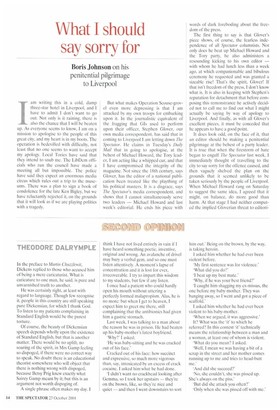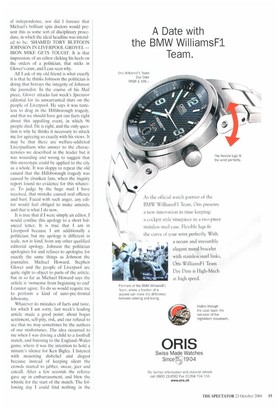What I should say sorry for
Boris Johnson on his penitential pilgrimage to Liverpool
am writing this in a cold, damp three-star hotel in Liverpool, and I have to admit I don't want to go out. Not only is it raining, there is also the chance that I will be beaten up. As everyone seems to know, I am on a mission to apologise to the people of this great city, and my heart is in my boots. The operation is bedevilled with difficulty, not least that no one seems to want to accept my apology. Local Tories have said that they intend to snub me, The LibDem officials who run the council have made a meeting all but impossible. The police have said they expect an enormous media circus which rules out a trip to the museums. There was a plan to sign a book of condolence for the late Ken Bigley, but we have reluctantly rejected it, on the grounds that it will look as if we are playing politics with a tragedy. But what makes Operation Scouse-grovel even more depressing is that I am attacked by my own troops for embarking upon it. In the journalistic equivalent of the fragging that GIs used to perform upon their officer, Stephen Glover, our own media correspondent, has said that in coming to Liverpool I am letting down The Spectator. He claims in Tuesday's Daily Mail that in going to apologise, at the behest of Michael Howard, the Tory leader, I am acting like a whipped cur, and that I have compromised the integrity of the magazine. Not since the 15th century, says Glover, has the editor of a national publication been treated like the plaything of his political masters. It is a disgrace, says The Spectator's media correspondent, and shows that I cannot simultaneously serve two leaders — Michael Howard and last week's editorial. He ends his piece with words of dark foreboding about the freedom of the press.
The first thing to say is that Glover's piece shows, of course, the fearless independence of all Spectator columnists. Not only does he beat up Michael Howard and the Tory party, he also administers a resounding kicking to his own editor — with whom he had lunch less than a week ago, at which companionable and bibulous ceremony he requested and was granted a sizeable rise! That's the spirit, Glover! If that isn't freedom of the press, I don't know what is. It is also in keeping with Stephen's reputation for detachment that before composing this remonstrance he actively decided not to call me to find out what I might actually be saying by way of apology to Liverpool. And finally, as with all Glover's excellent pieces, it must be conceded that he appears to have a good point.
It does look odd, on the face of it, that an editor should be making a penitential pilgrimage at the behest of a party leader. It is true that when the firestorm of hate began to engulf The Spectator last week, I immediately thought of travelling to the city to say sorry for the offence caused, and then vaguely shelved the plan on the grounds that it seemed unlikely to be taken seriously by the people of Liverpool. When Michael Howard rang on Saturday to suggest the same idea, I agreed that it might, on balance, do more good than harm. At that stage I had neither computed the implied Gloverian threat to editori
al independence, nor did I foresee that Michael's brilliant spin doctors would present this as some sort of disciplinary procedure, in which the ideal headline was intended to be: 'SHAMED TORY BUFFOON JOHNSON IN LIVERPOOL GROVEL — IRON MIKE GETS TOUGH'. It is that impression, of an editor clicking his heels on the orders of a politician, that sticks in Glover's craw, and I can seen why.
All I ask of my old friend is what exactly it is that he thinks Johnson the politician is doing that betrays the integrity of Johnson the journalist. In the course of his Mail piece, Glover attacks last week's Spectator editorial for its unwarranted slurs on the people of Liverpool. He says it was tasteless to drag in the Hillsborough tragedy, and that we should have got our facts right about this appalling event, in which 96 people died. He is right, and the only question is why he thinks it necessary to attack me for agreeing so exactly with his views. It may be that there are welfare-addicted Liverpudlians who answer to the characteristics we described in the leader but it was wounding and wrong to suggest that this stereotype could be applied to the city as a whole. It was sloppy to repeat the old canard that the Hillsborough tragedy was caused by drunken fans, when the inquiry report found no evidence for this whatever. To judge by the huge mail I have received, that mistake caused real offence and hurt. Faced with such anger, any editor would feel obliged to make amends, and that is what I do now.
It is true that if I were simply an editor, I would confine this apolog to a short balanced letter. It is true that I am in Liverpool because I am additionally a politician; but my apology is different in scale, not in kind, from any other qualified editorial apology. Johnson the politician apologises for and refuses to apologise for exactly the same things as Johnson the journalist. Michael Howard, Stephen Glover and the people of Liverpool are quite right to object to parts of the article, but in so far as Michael Howard says the article is 'nonsense from beginning to end' I cannot agree. To do so would require me to perform a kind of auto-pre-frontal lobotomy.
Whatever its mistakes of facts and taste, for which I am sorry, last week's leading article made a good point: about bogus sentiment, self-pity, risk, and our refusal to see that we may sometimes be the authors of our misfortunes. The idea occurred to me when I was driving a child to a football match, and listening to the England–Wales game, where it was the intention to hold a minute's silence for Ken Bigley. I listened with mounting disbelief and disgust because instead of keeping silent the crowds started to jabber, swear, jeer and catcall. After a few seconds the referee gave up in embarrassment, and blew the whistle for the start of the match. The following day I could find nothing in the
sense. Only those who killed Ken Bigley had blood on their hands, and it should not be taboo to say so.
It is important to make this point about our tendency to blame the state, because we live in an increasingly atomised society, where the state does more and more and where means-tested benefits multiply, and where good human emotions and affections that might once have been directed towards neighbours and family are now diverted into outbursts of sentimentality. We are in some ways as callous in our treatment of old people as any country in the world; and yet we are so sentimental about non-human beings, and so tyrannical in our sentimentality, that we are about to become the first outpost of civilisation to ban hunting.
We are so ready to see ourselves as victims that we have an increasingly hysterical health-and-safety compensation culture in which the chief culprits are scaremongering journalists, cowardly politicians and muddled judges who ought to throw out the attempts by lawyers to blame someone else — usually the state — for the misfortunes of their clients. Such are the views of The Spectator, its editor, and of Stephen Glover and, I bet, of Michael Howard as well. I heartily and sincerely apologise for the offence caused by last week's leader, and for the tasteless inaccuracies with which the point was made. But I cannot retract that point.


























































































 Previous page
Previous page